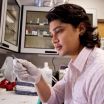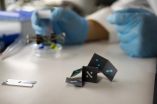(Press-News.org) In today's computer processors, much of the power put into running the processor is being wasted.
A research team at Case Western Reserve University came up with a novel idea called fine-grained power gating, which saves power and money in a couple of ways: less energy would be used, and less heat produced.
"Using less power produces less heat. Less heat means less cooling is needed," said Swarup Bhunia, professor of electrical engineering and computer science and an author of the research. "That can avoid the need for a big fan to cool off the processor, which saves a lot of money."
Processors are used in a variety of products, from computers to cell phones. Operational costs could be cut by more than one-third, the researchers say.
Bhunia, PhD student Lei Wang and PhD alumni Somnath Paul, whose work was funded by the Intel Corporation; presented their idea at the 25th International Conference on VLSI (Very-Large-Scale Integration) Design.
They received the award for best paper at the conference, held in Hyderabad, India Jan 7-11.
Bhunia explained that two parts of a processor consume power: the datapath and memory. The datapath performs computations and takes control decisions, while memory stores data.
The waste is built-in. Computing rarely requires everything that a processor is capable of all the time, but all of the processor is fully powered just the same.
For example, while the processor might not always be doing addition, the component that performs addition is still being powered.
One attempt to improve power dissipation in processors is through something called coarse gating. It switches off an entire block of the processor that is not being used.
In the previous example, the coarse gating solution would be to just simply turn off the addition block when it is not doing addition.
The problem with this method is that most of the time, some part of every component is being used in a processor. Finding an entire block that is not being used at a given time is tough.
The Case Western Reserve team's fine-grained gating idea is to shut off only the parts of a component that are not being used at the time.
While the addition component needs to be capable of adding extremely large numbers, it rarely needs to actually add large numbers. The processor might be using the addition block constantly, but the parts needed to add large numbers can be turned off most of the time.
Memory works the same way. A processor needs to be capable of storing large numbers, but seldom actually stores them.
This may not seem like much, but add everything up and it makes a big difference. The team calculated that the total power savings for a typical processor in a high-performance system, such as a desktop computer, would be about 40%.
Bhunia explained that fine gating can't be applied to current processors, but could be used by companies to build next generation processors.
This new method does not only help corporations though. With fine-grained gating, a smart phone battery that lasted eight hours could now more than 11.
That's three more hours of Angry Birds and Words with Friends, which is a win for everyone.
INFORMATION:
Release prepared by Andrew Gronski, a freshman electrical engineering major.
END
Boston, MA – When babies are born prematurely, they are thrust into a hospital environment that while highly successful at saving their lives, is not exactly the same as the mother's womb where ideal development occurs. The Neonatal Intensive Care Unit (NICU) is equipped with highly skilled care givers and incubators that regulate temperature and humidity, but Amir Lahav, ScD, PhD, director of the Neonatal Research Lab at Brigham and Women's Hospital (BWH) thought that something was missing - simulation of the maternal sounds that a baby would hear in the womb. Now, new ...
In the nearly five decades since the first lunar surveys were conducted as part of NASA's Apollo program, scientists have advanced a number of increasingly complex theories to explain the vast swaths of highly magnetic material that had been found in the some parts of the Moon's crust.
But now a team of researchers from Harvard, MIT and the Institut de Physique du Globe de Paris, have proposed a surprisingly simple explanation for the unusual findings – the magnetic anomalies are remnants of a massive asteroid collision. As described in a paper published March 9 in Science, ...
Cambridge, Mass. - March 8, 2012 - Researchers in applied physics have cleared an important hurdle in the development of advanced materials, called metamaterials, that bend light in unusual ways.
Working at a scale applicable to infrared light, the Harvard team has used extremely short and powerful laser pulses to create three-dimensional patterns of tiny silver dots within a material. Those suspended metal dots are essential for building futuristic devices like invisibility cloaks.
The new fabrication process, described in the journal Applied Physics Letters, advances ...
Toronto – Countries that more strictly uphold their cultural norms are less likely to promote women as leaders – unless those norms support equal opportunity for both sexes, shows a new paper from the University of Toronto's Rotman School of Management.
"Cultural tightness can prevent the emergence of women leaders because tighter cultures may make a society's people more resistant to changing the traditionally-held practice that placed men in leadership roles," says Prof. Soo Min Toh, who is cross-appointed to the Rotman School and the University of Toronto Mississauga, ...
Winston-Salem, N.C. – March 8, 2012 -- Maternal obesity may contribute to cognitive impairment in extremely premature babies, according to a new study by researchers at Wake Forest Baptist Medical Center.
"Although in the past decade medical advances have improved the survival rate of babies born at less than seven months, they are still at very high risk for mental developmental delays compared with full-term infants," said Jennifer Helderman, M.D., assistant professor of pediatrics at Wake Forest Baptist and lead author of the study. "This study shows that obesity doesn't ...
Washington, DC – A collaborative team of researchers at Children's National Medical Center are making progress in understanding how to protect infants needing cardiac surgery from white matter injury, which impacts the nervous system. The synergistic team from the Children's National Heart Institute and Center for Neuroscience Research at Children's National Medical Center was led by Nobuyuki Ishibashi, MD, Joseph Scafidi, DO, Richard Jonas, MD, and Vittorio Gallo, PhD. The study, published online in the January edition of Circulation, identifies the stages of white matter ...
Philadelphia, PA, March 6, 2012 – The Canadian Journal of Cardiology has published a paper on the effect of socioeconomic factors on myocardial infarction outcomes.
This study describes an analysis of the effect of socioeconomic class on outcomes after a first myocardial infarction ("heart attack"). The study analyzed detailed databases in Quebec and found that socioeconomic deprivation did not negatively affect access to the most advanced high-level health care – clearly a success for the Canadian public healthcare system. Nevertheless, mortality rates were slightly ...
AUSTIN, Texas — Inspired by the paper-folding art of origami, chemists at The University of Texas at Austin have developed a 3-D paper sensor that may be able to test for diseases such as malaria and HIV for less than 10 cents a pop.
Such low-cost, "point-of-care" sensors could be incredibly useful in the developing world, where the resources often don't exist to pay for lab-based tests, and where, even if the money is available, the infrastructure often doesn't exist to transport biological samples to the lab.
"This is about medicine for everybody," says Richard Crooks, ...
Young America, http://www.young-america.com, an incentive marketing firm, has hired Steve Schulte as senior sales executive responsible for new business development initiatives and strategic growth focusing on opportunities among large clients.
Prior to joining Young America, Schulte worked for Restaurant.com as national account manager. He previously held leadership positions in the sales departments of loyalty and incentive companies Maritz, Inc. and Meridian Enterprises, and has experience in the technology, automotive, hospitality and insurance industries. He holds ...
Sometimes the fastest pathway from point A to point B is not a straight line: for example, if you're underwater and contending with strong and shifting currents. But figuring out the best route in such settings is a monumentally complex problem — especially if you're trying to do it not just for one underwater vehicle, but for a swarm of them moving all at once toward separate destinations.
But that's just what a team of engineers at MIT has figured out how to do, in research results to be presented in May at the annual IEEE International Conference on Robotics and Automation. ...

